Subarna Prasad Acharya's Blog
May 23, 2017
Absence
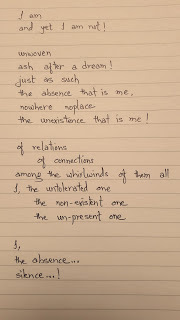
ABSENCE
["Absence" is a poetic piece i originally composed in Nepali: one of a few, rare, poetic compositions i had originally done in Nepali and later translated into English. A lot of people speaking in a video inspired me to read out this poem on YouTube. https://www.youtube.com/watch?v=MMle6pFrNzk
My voice does not sound beautiful, or attractive, or pleasant — a hoarsely croaking throat as that of a frog suffering from cold! And that too required my waiting until late night hours for a couple of days to record the audio on my mobile phone: man-made noises fill the air around me most of the time and that disturbs my peace, my quietude, my concentration!!
The text, the video clips, the audio, all are my original. The video clips were filmed on an Android handset and later combined and edited.
"Absence" is a void of desperation, an emptiness of being alone (not that of choosing to be, but...), a weariness that oftentimes hits us all; and the tiredness, the defeat, the giving up, the surrender... i try to fill it with what i can create (otherwise i have far fewer privileges! ), and fell grateful for what there is; otherwise there is not much in there!!! There is an absence...
In all this absence, thank you for being.]
-----------------
iat oncea loss of existence!picked up by some strangerand pocketed alonga road to an alien land!
dropped somewherei, a friend for play!Time’s overflowbut closed by Death’s embrace!
a bridge between two worldscrossed overagain and again!
unheld tight to some bosomand thrown away fromthe very heart!but stillgrasped by some unknown handto be filled oncewith an empty life!
somewhere,someplaceunder manhunt,i, the unfound one!
in between life and death,among crowd after crowdof people, i,the unassimilated one!and yet entangledalone in a stranger weba sky that had wept without tears!
i am,and yet i am not!
unwovenash after a dream!just as suchthe absence that is me,nowhere noplacethe un-existence that is me!
of relationsof connectionsamong the whirlwinds of them alli, the untolerated onethe non-existent onethe un-present one
i,the absence…silence…!
*** --- *** --- ***
कुनै समयकतै हराएको मान्छे म! कुनै अपरिचितले टपक्क टिपेरपोल्टामा राखि हिँडेको---गुमनाम देशको बाटो!
कतै फुत्त खसेकोम, एउटा खेल्ने साथी! समयको बाढी मृत्यूले काखी च्यापेको म!
पटक पटक ओहोर दोहोर गरेको दुई दुनियाँको साँघु!
कसैले उठाएर छातीमा टाँस्न नसकेकोमनदेखि कतै फ्याँकिएको म! तर पनिकसैले च्पाप्प हात समातेरएक पटकलाई भरिएको रित्तो जिवन!
कहिँकतैखोज्दा खोज्दैनभेटिएको म! जिवन र मरणको बिचतिरमानिसहरुको भिड्---तर पनि कतै नसमेटिएको म!
एक्लै एक्लै एउटा अनौठो जालोमा अल्झेरबिना आँसु रोएको आकाश!
म छुर पनि छैन।नसँगालिएको,सपना पछिको खरानी!
यस्तै यस्तै नभएको म,कहिँ कतै नरहेको म!
नाता र सम्बन्धकोभुमरीहरु माझकहिँ कसैले नसहेको म! हुँदै नभएको म, कतै नरहेको म!! * * * * * * *
(Poem originally written in English; later translated into Nepali by the author. © Subarna Prasad Acharya, 2016, 2017; all rights reserved. Read out on YouTube by the author. https://www.youtube.com/watch?v=MMle6pFrNzk )
Published on May 23, 2017 22:13
October 24, 2016
THE CYCLING BUG: TOUR de LALITPUR
The Cycling Bug's Tour of Lalitpur on a Mountainbike.
 A bug bit me a few years back, and since then it has made me restless.
A bug bit me a few years back, and since then it has made me restless.
It makes me travel just like the wind.
It does not matter where, to what direction, with whom. What matters is just how, and the beginning of this story.
I had wanted to make a cycling trip around the accessible part of Lalitpur since a long time, but it mostly got postponed for one reason or another. At one time it was my un-preparedness that held me back; at the other I simply had no heart to do it alone. And so it had rested. Friends were busy: some with their busy work schedule, some had their equipment damaged from the previous trip and needed urgent repairs, and there were still some others who had health-related issues that prevented them from getting outdoors and made them something like couch potatoes with knee problems and joint problems. There were many other trifling issues that prevented things from happening, and my travel plan simply got postponed.
I was a bit tired for quite some week: writing one proposal after another, trying this listing and that, and being unable to make a sale… It was all mentally very depressing. I just needed a change, and needed it fast. But it just had to come by itself, suddenly.
June 18, 2016, and I woke up at four in the morning, unusually. Another bad day, I was thinking half awake. Why so early? Half naked, I looked outside the window. It was light, alright, but the air felt gloomy white and the sky overcast with early monsoon clouds. Once awake I am not the type that can easily crawl back into bed. A cup of water, almost half a litre of that, and I got dressed, half of me wishing I could go back to sleep while the other half of me wishing I could clear the clouds of depression from the air, at least for a day. A camera, an extra battery, emergency maintenance toolkit, a survival tool set, a few tablets and water disinfectant together with some standard bandages for minor wounds, a rain poncho, and a litre of water... all shoved haphazardly into my small backpack and I was out with my bicycle in another half an hour. Local tea shops were still not open and I soon hit the open road.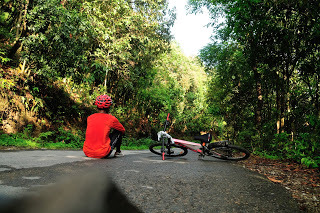
I had no idea what cycling for a full day along a less-travelled road was going to be like but I just wanted to get out of the dusty city and its chaotic traffic. There was a group of cyclists taking the same road as I was and it cheered me a little just to know that I will be having some sort of company at least. I did not know what they would be like on the trail: friendly or reserved, helpful or introverted. As it happens with me, I was mentally prepared for eventualities, so I threw everything to the wind and continued pedalling. “Come on,” I would tell myself from time to time. “It’s your road.” But then I would, from time to time, keep looking back to see if there were any signs of others. They were either already gone ahead of me – but that could not be the case as it was still very early – or else they were just looking for each other. I pedalled on for about an hour.
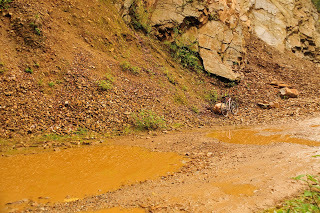 Half past six, a local told me at Chapagaon. Time for tea, and a lubrication check-up: the chain was struggling a bit so I squeezed out some drops of lubricating oil. It now felt smoother after the treatment and a cup of tea served well. I kept my eyes on the road but there was no sign of them. The locals had not seen any one pass by before me. Damn! I retorted. They’re cowards afraid of the distance and the monsoon rains, so they postponed their trip again, I tried to console myself. I was wrong, I would discover later, but the impatience hit me and I ordered another cup of tea before hopping on to my saddle.
Half past six, a local told me at Chapagaon. Time for tea, and a lubrication check-up: the chain was struggling a bit so I squeezed out some drops of lubricating oil. It now felt smoother after the treatment and a cup of tea served well. I kept my eyes on the road but there was no sign of them. The locals had not seen any one pass by before me. Damn! I retorted. They’re cowards afraid of the distance and the monsoon rains, so they postponed their trip again, I tried to console myself. I was wrong, I would discover later, but the impatience hit me and I ordered another cup of tea before hopping on to my saddle.
The road sections were muddy with potholes full of dark water. Occasional vehicle that passed simply splashed muddy water over you and you cursed the driver as you pedalled along. The nice looking tarmac suddenly turned into gravel and you started sweating even though birds sang the monsoon songs all around you. The forest air was clean, the air cool and calm, the trail enjoyable, and the bike was obedient to a large extent. I found the black road again and soon I was in the small town of Lele.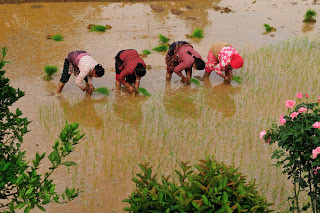
A group of women were planting a paddy and I managed to capture them in frame. Their song was beautifully melodic but I had left my mobile phone behind and had no audio recording equipment. They made jokes with me and my camera but that was easily passed with a burst of merry laughter. A little way off someone was selling cucumbers and I got a decent size from him for 30 rupees. It was a juicy treat before the long tiring climb. There was still no sign of them. Boggers!
It happens. Panting for breath, stopping for water, taking a few minutes in an attempt to relax the muscles of the groins aching from the discomfort of the saddle, stretching the eyes along the trail you just climbed to see if anyone is following you for company, and when you find out you have a long way to go, you take the left turn from the fork and continue along until you find a small hut on the right side just by the road and ask whether they could provide some home-brew called “airak”. So nice that they did provide it in a small stainless steel glass that helped me gulp down some bites of the previous day’s samosas that I had carried for breakfast.
[image error] And as I was gulping my breakfast down, they whizzed past. “Your friends,” men inside the little hut shouted. Wow! I jumped, almost. They were not exactly my friends, but I knew one or two of them. They did take the road after all, and that felt comforting.
Dark red plums loaded with magnesium salts and vitamins lingered in the mouth even after minutes had passed as I descended downhill. They travelled just for the sake of travelling and many of them complained about this or that and this or that not being available to their liking. If you wanted city service all along why come here to these remote parts, I wanted to ask, but I had a camera and I loved photography. Why waste precious time talking about deep matters and things they barely understood. I would rather, when the sky permitted, wait a minute or two just to capture a local woman walking down the road with a huge load of fodder on her back. And she would complain why I had taken a picture of hers with such a load and such a thick coat of mud on her legs. I would keep smiling, trying to evade the scrutinizing questions.
It was a great day for mountain-biking with cloud cover for almost the whole day but a sad day for photography: as soon as I took the camera out of its waterproof bag, drops would start falling down. And I had to shove it back in, under layers of rain-proof fibres. However, the journey was pleasant. Some occasional motorcyclist would whizz past with high revving engines, giving such a queer look to me as if he had never expected to see someone cycling in that weather in that part of the mountain. Perhaps he thought it strange that someone would for reasons unknown choose to cycle those mountain sides with the thin tyres spraying dirt all over. It was a tiring job, he barely knew and hardly understood. “Pheeewwwww!” I sighed and continued along until I saw a tiny hut by the road side. I was hungry as hell. [image error]
Men were drinking white liquid in an equally white battered aluminium bowl. “Chhang”, I understood as it needed no introduction. Asking a bowl for myself, I sat down and dug into my bag. Yeah, there were two pieces of samosas left. The bites felt so good, and the bowl of home-made beer was heavenly. They were far behind me, and I only saw the small white pick up truck coming. Out of a group of 23, three of them had managed to carry their bikes along on the back of that smoke-belching metallic beast. The devils! They couldn’t even cycle a few hours. Ten rupees a bowl served quite well that afternoon.
Then it was downhill, one of the best trails after Bhardev, to Chaughare, or Char-Ghare as many called it. The road twisted to the right and left, and then to the right again, and then to the left, in numerous bends as green paddies far down the valleys on either side were occasionally interrupted by a house or two. An almost empty road, punctuated only with the sound of rubber rolling along the black surface of the asphalt tarmac. From one scenic wonder to another, the road took me along a journey that somehow felt like trans-Alp tour on a mountain-bike: I have not been there but the similarities are marvellous: the Alpen-Cross, you could easily call it.
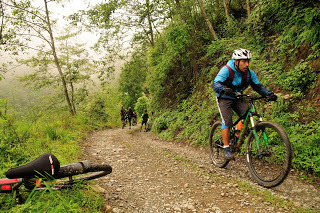 The climb again on the other side of the gorge with thick forests and I wished I had company: to sit at some local house asking for the traditional sauerkraut and maize-flour pudding. Alone, I just had no heart to do it as the journey was still too long to make. Asking a young driver for directions, I left the main road and took the heavily rocky one to the left. Pedalling was difficult; my bicycle had just to be pushed along the bumpy slope.
The climb again on the other side of the gorge with thick forests and I wished I had company: to sit at some local house asking for the traditional sauerkraut and maize-flour pudding. Alone, I just had no heart to do it as the journey was still too long to make. Asking a young driver for directions, I left the main road and took the heavily rocky one to the left. Pedalling was difficult; my bicycle had just to be pushed along the bumpy slope.
The sky offered no comfort for photography and I had my rain-poncho on. Such bad luck. Ten minutes turned into thirty, and thirty minutes into ninety but the climb would continue on and on. And finally, in the misty mountains, long dome-roofed brown coloured bunches of straw huts appeared. Mushrooms?!! It was a huge surprise at that remote spot. Where would they take the produce to sell? But the answer to my inmost question at that time came by itself. As long as there is life, there is hope; and as long as there is hope people will keep doing things that they believe will better their lives. And here, in front of my eyes, were the exact manifestation of that truth: people will carry loads on their back for hours to get to the road, then wait another series of hours to take their produce to the market that takes another series of hours to reach. Just to keep the hopes alive, just to feed the dreams. And that is life, a great reality.
“Hello,” someone came along. A little voice. “Hey, come. See there’s a foreigner,” he was soon shouting to his friends. And soon a bunch of them surrounded me. “Look, look,” someone added, “it’s a bike with disc brakes.” “W—o—w! What an amazing bike.”“Just look at the colour.”
And they continued in their own childish manner of innocence. No doubt very few outsiders visited their place, and very rare few with mountain bikes. But nonetheless, some actually did, and that is how these curious little minds filled their young brains with at least some knowledge of things they barely got a chance to touch. Yet again, there were motorbikes parked on a side stand in the mud. In all likelihood, the parents and guardians of these little children use the Indian-made beasts to carry their produce to the markets.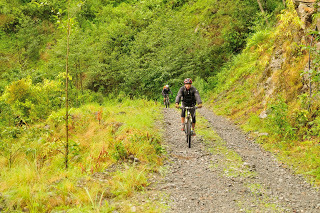
"Where you going?” One of them asked me.
“Me?” I asked. They nodded their heads in affirmation. I did not feel it appropriate to disappoint these young minds by revealing myself as a fellow countryman, and so I chose to answer them in the same language as they had picked. “I’m going to Batase Da(n)da. You know where that is?”
One of them pointed to the left along a red muddy trail littered with huge muddy potholes. I had guessed as much, recollecting the memory of studying the map of the trail online just the previous evening. Had there been some old people, I might have stayed for a little while asking for a glass of buffalo milk or things like that, but I did not see any grown up, and my heart felt uneasy going into serious business with the kids. Even the grown-ups in the mountains would not talk to strangers oftentimes, so I decided I better move on. But they ran on either side of me following my bicycle. “Go back,” I shouted at them. I did not want them to fall and get injured. “Go home,” I shouted again and again until their voices faded in the distance and the muddy trail changed into a rocky one taking me down the mountainside of Khar Bhanjyang. My brakes started making uneasy noises on the bumpy downhill trail and I had to stop. Damn! The pads on the front were worn out, and it took me more than half an hour to change the pads and to tune them. Luckily, a local farmer provided a glass of thin watery very sour whey for which I was very thankful.
I saw the bunch as I hit the road again after the stop but one of them had a bad fall breaking his helmet and getting bruised on his hips and arms. He was lucky he had a lot of muscles covering up his bones; otherwise, had he been a thin twig like myself, he would have perhaps broken at least a few of his bones. I offered a piece of fabric to cover up his wound, and also gave them a spare shoe-lace to hold it in place. Then I gave him a couple of ibuprofen tablets as pain-killer but their leader would not accept my offer of disinfectant. They perhaps though of me as an intruder, and finding no way out to help him any further I chose to leave them, feeling very uneasy inside myself.
I am an endurance runner, and so instead of pushing myself too hard, I prefer to do it slow and steady maintaining a more or less constant pace all along. I also have my own way of moving along: I talk to people, I share their stories, I capture a few shots, I share laughters and I build relationships. But here, in the thick rain with heavy clouds of vapour rising from the ground as the drops from heaven beat hard upon the rocks, I kept pushing my bike along: me and my bike along the trails of Chhepare Da(n)da, Batase Da(n)da, DhungKharka... and all along, the misty mountains never raised their veil of rain-clouds for what might perhaps have been some majestic scenery and some great frames captured with my camera. The trail, the bike, the heavy downpour, and the breathing was all that I had. Then the last descent down the bumpy stony track to Panauti and it got quite dark. The batteries in my torchlight were almost dead, and as I sought newer replacements in the local shops, the boys disappeared without saying a word. I did not see them later in the dark.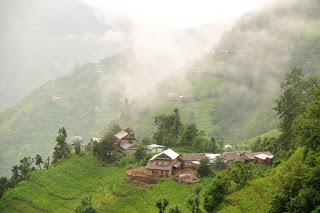
It was a great trail all along; a very memorable mountain-biking experience. They had been some sure company along the way and I was never a part of their long planning since the very beginning. They had their own group and if they preferred it to be like that, I would better be myself as well; with a faint headlight and a red blinking tail lamp I simply chose to continue along the highway as the night progressed.
(Text and photographs by Subarna Prasad Acharya. Portion of the map has been taken from Google Maps. Detailed map of the route is available here:
http://www.everytrail.com/view_trip.php?trip_id=1758055 )
[The author is an avid traveller, cyclist/mountain-biker, photographer, writer, and freelance guide. He has a blog (this one in particular), an Amazon author’s page, a National Geographic Your Shots page, and also a YouTube channel.]
 A bug bit me a few years back, and since then it has made me restless.
A bug bit me a few years back, and since then it has made me restless.It makes me travel just like the wind.
It does not matter where, to what direction, with whom. What matters is just how, and the beginning of this story.
I had wanted to make a cycling trip around the accessible part of Lalitpur since a long time, but it mostly got postponed for one reason or another. At one time it was my un-preparedness that held me back; at the other I simply had no heart to do it alone. And so it had rested. Friends were busy: some with their busy work schedule, some had their equipment damaged from the previous trip and needed urgent repairs, and there were still some others who had health-related issues that prevented them from getting outdoors and made them something like couch potatoes with knee problems and joint problems. There were many other trifling issues that prevented things from happening, and my travel plan simply got postponed.
I was a bit tired for quite some week: writing one proposal after another, trying this listing and that, and being unable to make a sale… It was all mentally very depressing. I just needed a change, and needed it fast. But it just had to come by itself, suddenly.
June 18, 2016, and I woke up at four in the morning, unusually. Another bad day, I was thinking half awake. Why so early? Half naked, I looked outside the window. It was light, alright, but the air felt gloomy white and the sky overcast with early monsoon clouds. Once awake I am not the type that can easily crawl back into bed. A cup of water, almost half a litre of that, and I got dressed, half of me wishing I could go back to sleep while the other half of me wishing I could clear the clouds of depression from the air, at least for a day. A camera, an extra battery, emergency maintenance toolkit, a survival tool set, a few tablets and water disinfectant together with some standard bandages for minor wounds, a rain poncho, and a litre of water... all shoved haphazardly into my small backpack and I was out with my bicycle in another half an hour. Local tea shops were still not open and I soon hit the open road.

I had no idea what cycling for a full day along a less-travelled road was going to be like but I just wanted to get out of the dusty city and its chaotic traffic. There was a group of cyclists taking the same road as I was and it cheered me a little just to know that I will be having some sort of company at least. I did not know what they would be like on the trail: friendly or reserved, helpful or introverted. As it happens with me, I was mentally prepared for eventualities, so I threw everything to the wind and continued pedalling. “Come on,” I would tell myself from time to time. “It’s your road.” But then I would, from time to time, keep looking back to see if there were any signs of others. They were either already gone ahead of me – but that could not be the case as it was still very early – or else they were just looking for each other. I pedalled on for about an hour.
 Half past six, a local told me at Chapagaon. Time for tea, and a lubrication check-up: the chain was struggling a bit so I squeezed out some drops of lubricating oil. It now felt smoother after the treatment and a cup of tea served well. I kept my eyes on the road but there was no sign of them. The locals had not seen any one pass by before me. Damn! I retorted. They’re cowards afraid of the distance and the monsoon rains, so they postponed their trip again, I tried to console myself. I was wrong, I would discover later, but the impatience hit me and I ordered another cup of tea before hopping on to my saddle.
Half past six, a local told me at Chapagaon. Time for tea, and a lubrication check-up: the chain was struggling a bit so I squeezed out some drops of lubricating oil. It now felt smoother after the treatment and a cup of tea served well. I kept my eyes on the road but there was no sign of them. The locals had not seen any one pass by before me. Damn! I retorted. They’re cowards afraid of the distance and the monsoon rains, so they postponed their trip again, I tried to console myself. I was wrong, I would discover later, but the impatience hit me and I ordered another cup of tea before hopping on to my saddle. The road sections were muddy with potholes full of dark water. Occasional vehicle that passed simply splashed muddy water over you and you cursed the driver as you pedalled along. The nice looking tarmac suddenly turned into gravel and you started sweating even though birds sang the monsoon songs all around you. The forest air was clean, the air cool and calm, the trail enjoyable, and the bike was obedient to a large extent. I found the black road again and soon I was in the small town of Lele.

A group of women were planting a paddy and I managed to capture them in frame. Their song was beautifully melodic but I had left my mobile phone behind and had no audio recording equipment. They made jokes with me and my camera but that was easily passed with a burst of merry laughter. A little way off someone was selling cucumbers and I got a decent size from him for 30 rupees. It was a juicy treat before the long tiring climb. There was still no sign of them. Boggers!
It happens. Panting for breath, stopping for water, taking a few minutes in an attempt to relax the muscles of the groins aching from the discomfort of the saddle, stretching the eyes along the trail you just climbed to see if anyone is following you for company, and when you find out you have a long way to go, you take the left turn from the fork and continue along until you find a small hut on the right side just by the road and ask whether they could provide some home-brew called “airak”. So nice that they did provide it in a small stainless steel glass that helped me gulp down some bites of the previous day’s samosas that I had carried for breakfast.
[image error] And as I was gulping my breakfast down, they whizzed past. “Your friends,” men inside the little hut shouted. Wow! I jumped, almost. They were not exactly my friends, but I knew one or two of them. They did take the road after all, and that felt comforting.
Dark red plums loaded with magnesium salts and vitamins lingered in the mouth even after minutes had passed as I descended downhill. They travelled just for the sake of travelling and many of them complained about this or that and this or that not being available to their liking. If you wanted city service all along why come here to these remote parts, I wanted to ask, but I had a camera and I loved photography. Why waste precious time talking about deep matters and things they barely understood. I would rather, when the sky permitted, wait a minute or two just to capture a local woman walking down the road with a huge load of fodder on her back. And she would complain why I had taken a picture of hers with such a load and such a thick coat of mud on her legs. I would keep smiling, trying to evade the scrutinizing questions.
It was a great day for mountain-biking with cloud cover for almost the whole day but a sad day for photography: as soon as I took the camera out of its waterproof bag, drops would start falling down. And I had to shove it back in, under layers of rain-proof fibres. However, the journey was pleasant. Some occasional motorcyclist would whizz past with high revving engines, giving such a queer look to me as if he had never expected to see someone cycling in that weather in that part of the mountain. Perhaps he thought it strange that someone would for reasons unknown choose to cycle those mountain sides with the thin tyres spraying dirt all over. It was a tiring job, he barely knew and hardly understood. “Pheeewwwww!” I sighed and continued along until I saw a tiny hut by the road side. I was hungry as hell. [image error]
Men were drinking white liquid in an equally white battered aluminium bowl. “Chhang”, I understood as it needed no introduction. Asking a bowl for myself, I sat down and dug into my bag. Yeah, there were two pieces of samosas left. The bites felt so good, and the bowl of home-made beer was heavenly. They were far behind me, and I only saw the small white pick up truck coming. Out of a group of 23, three of them had managed to carry their bikes along on the back of that smoke-belching metallic beast. The devils! They couldn’t even cycle a few hours. Ten rupees a bowl served quite well that afternoon.
Then it was downhill, one of the best trails after Bhardev, to Chaughare, or Char-Ghare as many called it. The road twisted to the right and left, and then to the right again, and then to the left, in numerous bends as green paddies far down the valleys on either side were occasionally interrupted by a house or two. An almost empty road, punctuated only with the sound of rubber rolling along the black surface of the asphalt tarmac. From one scenic wonder to another, the road took me along a journey that somehow felt like trans-Alp tour on a mountain-bike: I have not been there but the similarities are marvellous: the Alpen-Cross, you could easily call it.
 The climb again on the other side of the gorge with thick forests and I wished I had company: to sit at some local house asking for the traditional sauerkraut and maize-flour pudding. Alone, I just had no heart to do it as the journey was still too long to make. Asking a young driver for directions, I left the main road and took the heavily rocky one to the left. Pedalling was difficult; my bicycle had just to be pushed along the bumpy slope.
The climb again on the other side of the gorge with thick forests and I wished I had company: to sit at some local house asking for the traditional sauerkraut and maize-flour pudding. Alone, I just had no heart to do it as the journey was still too long to make. Asking a young driver for directions, I left the main road and took the heavily rocky one to the left. Pedalling was difficult; my bicycle had just to be pushed along the bumpy slope. The sky offered no comfort for photography and I had my rain-poncho on. Such bad luck. Ten minutes turned into thirty, and thirty minutes into ninety but the climb would continue on and on. And finally, in the misty mountains, long dome-roofed brown coloured bunches of straw huts appeared. Mushrooms?!! It was a huge surprise at that remote spot. Where would they take the produce to sell? But the answer to my inmost question at that time came by itself. As long as there is life, there is hope; and as long as there is hope people will keep doing things that they believe will better their lives. And here, in front of my eyes, were the exact manifestation of that truth: people will carry loads on their back for hours to get to the road, then wait another series of hours to take their produce to the market that takes another series of hours to reach. Just to keep the hopes alive, just to feed the dreams. And that is life, a great reality.
“Hello,” someone came along. A little voice. “Hey, come. See there’s a foreigner,” he was soon shouting to his friends. And soon a bunch of them surrounded me. “Look, look,” someone added, “it’s a bike with disc brakes.” “W—o—w! What an amazing bike.”“Just look at the colour.”
And they continued in their own childish manner of innocence. No doubt very few outsiders visited their place, and very rare few with mountain bikes. But nonetheless, some actually did, and that is how these curious little minds filled their young brains with at least some knowledge of things they barely got a chance to touch. Yet again, there were motorbikes parked on a side stand in the mud. In all likelihood, the parents and guardians of these little children use the Indian-made beasts to carry their produce to the markets.

"Where you going?” One of them asked me.
“Me?” I asked. They nodded their heads in affirmation. I did not feel it appropriate to disappoint these young minds by revealing myself as a fellow countryman, and so I chose to answer them in the same language as they had picked. “I’m going to Batase Da(n)da. You know where that is?”
One of them pointed to the left along a red muddy trail littered with huge muddy potholes. I had guessed as much, recollecting the memory of studying the map of the trail online just the previous evening. Had there been some old people, I might have stayed for a little while asking for a glass of buffalo milk or things like that, but I did not see any grown up, and my heart felt uneasy going into serious business with the kids. Even the grown-ups in the mountains would not talk to strangers oftentimes, so I decided I better move on. But they ran on either side of me following my bicycle. “Go back,” I shouted at them. I did not want them to fall and get injured. “Go home,” I shouted again and again until their voices faded in the distance and the muddy trail changed into a rocky one taking me down the mountainside of Khar Bhanjyang. My brakes started making uneasy noises on the bumpy downhill trail and I had to stop. Damn! The pads on the front were worn out, and it took me more than half an hour to change the pads and to tune them. Luckily, a local farmer provided a glass of thin watery very sour whey for which I was very thankful.
I saw the bunch as I hit the road again after the stop but one of them had a bad fall breaking his helmet and getting bruised on his hips and arms. He was lucky he had a lot of muscles covering up his bones; otherwise, had he been a thin twig like myself, he would have perhaps broken at least a few of his bones. I offered a piece of fabric to cover up his wound, and also gave them a spare shoe-lace to hold it in place. Then I gave him a couple of ibuprofen tablets as pain-killer but their leader would not accept my offer of disinfectant. They perhaps though of me as an intruder, and finding no way out to help him any further I chose to leave them, feeling very uneasy inside myself.
I am an endurance runner, and so instead of pushing myself too hard, I prefer to do it slow and steady maintaining a more or less constant pace all along. I also have my own way of moving along: I talk to people, I share their stories, I capture a few shots, I share laughters and I build relationships. But here, in the thick rain with heavy clouds of vapour rising from the ground as the drops from heaven beat hard upon the rocks, I kept pushing my bike along: me and my bike along the trails of Chhepare Da(n)da, Batase Da(n)da, DhungKharka... and all along, the misty mountains never raised their veil of rain-clouds for what might perhaps have been some majestic scenery and some great frames captured with my camera. The trail, the bike, the heavy downpour, and the breathing was all that I had. Then the last descent down the bumpy stony track to Panauti and it got quite dark. The batteries in my torchlight were almost dead, and as I sought newer replacements in the local shops, the boys disappeared without saying a word. I did not see them later in the dark.

It was a great trail all along; a very memorable mountain-biking experience. They had been some sure company along the way and I was never a part of their long planning since the very beginning. They had their own group and if they preferred it to be like that, I would better be myself as well; with a faint headlight and a red blinking tail lamp I simply chose to continue along the highway as the night progressed.
(Text and photographs by Subarna Prasad Acharya. Portion of the map has been taken from Google Maps. Detailed map of the route is available here:
http://www.everytrail.com/view_trip.php?trip_id=1758055 )
[The author is an avid traveller, cyclist/mountain-biker, photographer, writer, and freelance guide. He has a blog (this one in particular), an Amazon author’s page, a National Geographic Your Shots page, and also a YouTube channel.]
Published on October 24, 2016 04:37
July 31, 2016
The Quake that Killed Thousands
Looking Back at Nepal Earthquake of 2015: A Sad Memory
April 25, 2015.The morning felt usual. People drank tea at the local tea shops, chatted away time, laughed at a joke in a jovial mood. Early summer and yet the air felt heavily laden with the heat of the noon-day sun. It all passed just as usual.
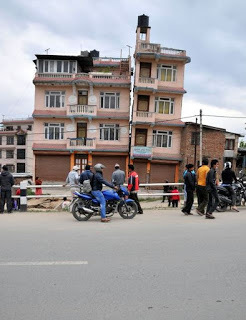 Having suffered a psychological trauma I had no job, and funnily no pocket on my shirt. No money, and no pocket to carry it; that would sound fine. And that made me feel a little uncomfortable. Working through an on-going book, I needed a place to hold and carry at least my pen, and having talked with an artisan who worked at a local business that produced ready-made wear I was planning for an upgrade: a patch-pocket on the left bosom of my half shirt.
Having suffered a psychological trauma I had no job, and funnily no pocket on my shirt. No money, and no pocket to carry it; that would sound fine. And that made me feel a little uncomfortable. Working through an on-going book, I needed a place to hold and carry at least my pen, and having talked with an artisan who worked at a local business that produced ready-made wear I was planning for an upgrade: a patch-pocket on the left bosom of my half shirt.He measured the shirt, we agreed upon a basic hexagon design, he rummaged through a small heap of discarded cut-pieces and somehow managed to produce a small piece of fabric that had an agreeable colour for a patch-work: it did not exactly match the colour of the shirt but was doable with. He immediately set to work in front of his electric sewing machine.
Leaning over with my hands on the table, I was fascinated by the high-speed movement of the needle, and a thin trail of thread that it left behind, on the fabric. PPP—RRRRRRR! The machine went on. PPP—RRRRR——PPP—RRRRR!!
“Why do you shake the table man?” he asked me after a little while as he was turning and folding the fabric piece, under the boot of the high-speed electric sewing machine.I was confused a little bit at his remark at first as I was not shaking his table, and drew back, standing straight. Damn! The full horror of it came into me just about then: the whole ground beneath me was shaking violently.
“It’s a quake,” I muttered. The ground felt unsteady, the wall moved, the machine rattled side to side. An eerie sound echoed into the head: the frightening sound of death looming close by.
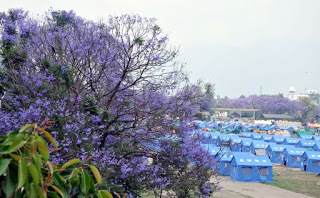 “What?!!” He asked, surprised.
“What?!!” He asked, surprised.“A qu—ake…” I shouted and tried to run out. Had it been at other times, I might have laughed at myself as I felt rather wobbly passing the narrow corridor, my hands feeling for a support on either side of me. The door was wide open and I could make out the bright light of day just a few meters off, but I alternated pressing on the right wall and the left a number of times just to cross the distance of a mere 5 or 6 meters: nothing was stable.
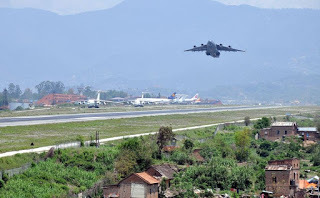 It felt like I was drunk-dancing even when outside of that trap-hole. I am not afraid of sudden death but the horror of being left crippled with a few bones broken upsets me all the time. The instinct then was to run, but once outside I could see the electric poles swaying in the air as if it was made of a flexible rubber. The bunch of wires clattered as they rubbed against each other. Commuters on motorbikes just dropped their vehicles and ran wobbly, horrified at the uncontrollable instability of the machine on wheels, and at the same time, not being sure of their own legs. The air was filled with echoes of helpless trepidation, and people around felt like dolls filled just with fear and nothing else, with horror written all over their empty faces. The ground was still shaking as if you were standing on a small dinghy and huge waves crashed against it.
It felt like I was drunk-dancing even when outside of that trap-hole. I am not afraid of sudden death but the horror of being left crippled with a few bones broken upsets me all the time. The instinct then was to run, but once outside I could see the electric poles swaying in the air as if it was made of a flexible rubber. The bunch of wires clattered as they rubbed against each other. Commuters on motorbikes just dropped their vehicles and ran wobbly, horrified at the uncontrollable instability of the machine on wheels, and at the same time, not being sure of their own legs. The air was filled with echoes of helpless trepidation, and people around felt like dolls filled just with fear and nothing else, with horror written all over their empty faces. The ground was still shaking as if you were standing on a small dinghy and huge waves crashed against it. 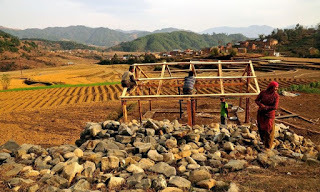 Knees half bent for balance as the ground continued shaking, I looked at the horror of things from the middle of the street: the poles swayed as if their sole purpose were to dance in a frightening manner while the cables they carried sang clattering songs. People’s voices filled the air: voices loud and low, far and near. Voices that appeared unusual to the ears as if all of that formed some background noise of some distant world. Adding to that, crows cawed from the air, and as I tried to look up at the roofs of the houses, I saw the buildings sway, the pillars supporting the water tanks high up on their rooftops sway dangerously. It was chaos all around.How long did it take for all of this to happen? About 45 seconds!
Knees half bent for balance as the ground continued shaking, I looked at the horror of things from the middle of the street: the poles swayed as if their sole purpose were to dance in a frightening manner while the cables they carried sang clattering songs. People’s voices filled the air: voices loud and low, far and near. Voices that appeared unusual to the ears as if all of that formed some background noise of some distant world. Adding to that, crows cawed from the air, and as I tried to look up at the roofs of the houses, I saw the buildings sway, the pillars supporting the water tanks high up on their rooftops sway dangerously. It was chaos all around.How long did it take for all of this to happen? About 45 seconds!Counting from one to forty-five with each ticking second of the clock; that is how long it all took. And after that, everyone was shaken. They brought out blankets and mattresses from their homes into the open grounds. “The quake went,” people say in our tongue. “It will return,” they shouted and whispered. Nobody was willing to stay indoors.
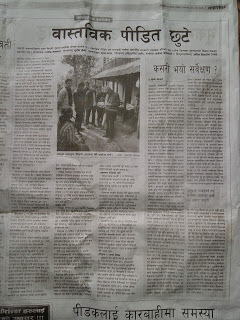 Old people got shaken to their cores. Young ones were not allowed by their parents to go inside their homes. One bunch in the ground followed another and another until the whole village settlement came out with one form of mattress or another. Water was fetched from the shops nearby as were light snacks, cigarettes and packs of playing cards. Then someone complained to someone else that it felt too hot. Someone rushed on a motorbike and fetched a tarpaulin from the nearby store. A tent was born in the open.
Old people got shaken to their cores. Young ones were not allowed by their parents to go inside their homes. One bunch in the ground followed another and another until the whole village settlement came out with one form of mattress or another. Water was fetched from the shops nearby as were light snacks, cigarettes and packs of playing cards. Then someone complained to someone else that it felt too hot. Someone rushed on a motorbike and fetched a tarpaulin from the nearby store. A tent was born in the open.Someone else drove some old stakes and sticks into the ground and spread plastic sheets over making another makeshift tent for the older relatives.
Local shops ran out of snacks and water and juices in no time. Radio broadcasts talked about possible after-shakes; old people already had specific language referrals for “going” and “returning back” of the quake.
A jerk followed. Then another movement that shook the ground. Terrified people brought out their stoves and cooking pots and pans into their tents, locking their homes from outside. At some point, it even felt like people were now going back in time: abandoning their concrete houses for the sake of plastic and tarpaulin tents. It felt so overwhelming. The next day, television news and video footages came out: buildings collapsed, monuments crumbled, people got buried, hospitals became overcrowded with the injured. Chaos and destruction overshadowed everything !
A sense of helplessness followed everyone, everywhere. Then the international community responded. Aid started to pour in. The only international airport in the country became overloaded and burst its seams, diverting passenger jets elsewhere as the cargo-carrying giants landed and took off. Some of the largest planes ever made came in and went away; some of the strangest planes such as the Harrier Jets came over for rescue operations.
The Israelis came with their mobile hospitals, the Chinese and the Japanese came with tents and sophisticated rescue equipment, the French came with the medicines. The Indians came with media to proclaim false aid: “we did this and that, and reached here and there, before anyone else” they claimed. Yes, they did reach places, but what help did they offer to the victims rather than carry their military and media personnel up to the Chinese border??
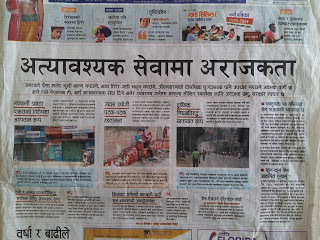 The people who were outside did not went in; those who were in came out one by one as the aftershocks continued. Open grounds became covered with tents of all odd shapes sizes and colours. Stores ran out of them in no time.
The people who were outside did not went in; those who were in came out one by one as the aftershocks continued. Open grounds became covered with tents of all odd shapes sizes and colours. Stores ran out of them in no time.Then another big shake followed on 12th May. The houses that were shaken by the first big quake collapsed down to the ground. The first one had been measured to be 7-points-8, they said; the second one was measured to be 7-points-3. A total of nearly ten thousand lost their lives. Millions became homeless.
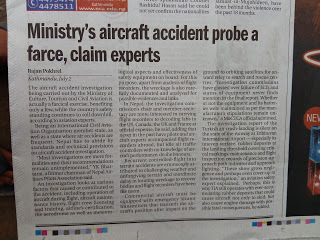 The government changed the rules where law and order does not exist. Donors could directly offer aid to the victims before, but now they could not; they had to go through government channels. Those who were receiving at least some now missed out on even food, water and medicine. Everything from tents and blankets to rice from Bangladesh, one of the poorest nations in the region, got channelized into government coffers. Were they actually distributed? I doubt it, given the fact that tents and blankets marked by the donors were later seen in the markets for sale. Rice disappeared somewhere, tents were seen inside the complexes of politicians and party leaders. All the money that were sent into the rehabilitation fund set up by the government got either unaccounted for, or has not been heard of since. As I write these lines, victims have already suffered two monsoon seasons and are still living under the tents and makeshift shelters. Roads are being swept away by monsoon floods, landslides are claiming lives of hundreds, and floods are sweeping away people as if they were mere ants! Many of these have been left out as the ones taking their surveys have not included them as victims in the database. Why? The officials were asking for bribes, and the poor were not able to pay them! What a shame!!
The government changed the rules where law and order does not exist. Donors could directly offer aid to the victims before, but now they could not; they had to go through government channels. Those who were receiving at least some now missed out on even food, water and medicine. Everything from tents and blankets to rice from Bangladesh, one of the poorest nations in the region, got channelized into government coffers. Were they actually distributed? I doubt it, given the fact that tents and blankets marked by the donors were later seen in the markets for sale. Rice disappeared somewhere, tents were seen inside the complexes of politicians and party leaders. All the money that were sent into the rehabilitation fund set up by the government got either unaccounted for, or has not been heard of since. As I write these lines, victims have already suffered two monsoon seasons and are still living under the tents and makeshift shelters. Roads are being swept away by monsoon floods, landslides are claiming lives of hundreds, and floods are sweeping away people as if they were mere ants! Many of these have been left out as the ones taking their surveys have not included them as victims in the database. Why? The officials were asking for bribes, and the poor were not able to pay them! What a shame!! Those who never had homes in the first place got registered as victims and received donations; those who have had everything taken away with their homes remained left out. Houses and buildings that never should have been authorized for construction in the first place also suffered the consequences; but who was there to blame? Nobody took any responsibility.
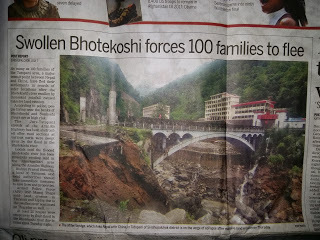 It is sad that the donor community had given freely for the use of people during the time of crisis, but the corrupt government and officials have freely used them as their own and neglected the plight of millions. It is also sad that Nepal Food Corporation, the sole state agency responsible for food management and distributions is trying to sell rice donated by Bangladesh as it is not efficient in distributing it to the victims and poor people. Or is it that officials high up found it difficult to consume all the rice by themselves in collaboration with their relatives and hence are trying to convert it into money that everyone can consume?
It is sad that the donor community had given freely for the use of people during the time of crisis, but the corrupt government and officials have freely used them as their own and neglected the plight of millions. It is also sad that Nepal Food Corporation, the sole state agency responsible for food management and distributions is trying to sell rice donated by Bangladesh as it is not efficient in distributing it to the victims and poor people. Or is it that officials high up found it difficult to consume all the rice by themselves in collaboration with their relatives and hence are trying to convert it into money that everyone can consume? Almost two rainy seasons have passed now, and a year and a half has elapsed since the big quake; and more than a thousand small and big quakes have come and gone. Monsoon is heavy; the poor sleep under the tarpaulins and tents rattled by relentless rains while the rich and powerful are blind to the drops that perforate the roofs of fate. Life still continues but the rules keep changing: the reach of the rich knows no bounds, and there is no confusion as to what the rich with reach have been doing all along!
[Researched and written on the request of Tessy Beaulin; Radio 100.7, Luxembourg. Photographs first appeared in National Geographic: Your Shot page at http://yourshot.nationalgeographic.com/profile/378231 Newspaper clips are for reference purposes only. Texts and photographs by Subarna Prasad Acharya. © July 2016. All rights reserved.]
Published on July 31, 2016 01:38
April 24, 2016
Your Guide in the Himalayas
From Pokhara to Annapurna Base Camp, and back, in what is more widely known as the Annapurna Sanctuary Trek. Ask any travel/trekking agent/company that you would want to finish the trek in just 5 days and the only definite reaction that you will get in the end is the expression, “impossible!”
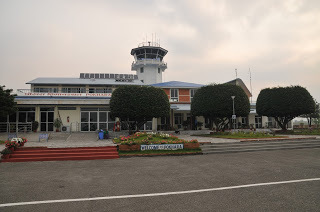 Pokhara Airport Tower and terminal building, 2016.
Pokhara Airport Tower and terminal building, 2016.A chartered helicopter flight may be possible, but what good is such a mode of transport in the wilderness? You would not want a pre-digested-and-blended glass of breakfast as that! You would like to have a bite, some time to chew, and then swallow, and find the feeling of satisfaction rather than blend egg, juice, salad, slices of bread, jam, butter, and ingredients such as coffee together into one big glass and then drink the resulting concoction!!! Where is the satisfaction in that? You would rather walk the trail admiring the scenery, curse the harsh demands of the trail, drag your heavy legs with the help of a stick, feel the silence, smell the air, take some pictures, sweat over… as you would invariably taste different items in your breakfast table. But just 5 days, you say?
An indirect answer. Maybe, Madame, you would like to consider. Sir, we recommend this, or that. We take care of this and that and those. We provide our own guide and/or porter. Damn! The final answer is still a big “IMPOSSIBLE” to your initial quest (or query).
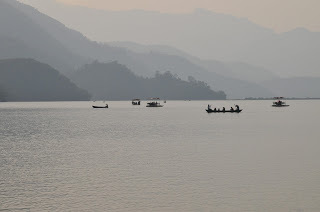 Boats in Phewa Lake, Pokhara.
Boats in Phewa Lake, Pokhara.There are many things a travel/trekking company in Nepal (or elsewhere in the world) will never tell you about. You pay about US $ 2000 for the trip under discussion here and you relax. Everything will be taken care of once you sign the documents or agree to the terms and conditions set forth. You don’t have to worry about food, bed or breakfast, and the itinerary. And you even get a guide who speaks with broken and oftentimes incomplete or incorrect English, and a porter if you ask for it. Oftentimes, your porter is your guide and the conversations lower down to a basic minimum as he would not talk much because he has not even completed his basic high school, and his communication skills are poor. You walk on your own, you set your own pace, and you walk the trail as if you are meant to walk. No relationship exists between you and your guide/porter for the most part, as most porters/guides simply work for the travel/trekking company, rather than working for you!
Come on. Grow a bit. The moment you agree to the terms and conditions of an agency/company, your pace is set, believe it or not, and you are not in control anymore, no matter what the appearances seem to be. From Pokhara to NayaPul, and even up to Ghandruk, your travel/trek agency will provide a vehicle. You then spend the first night there. Then your next night will be in Chhomroong, and your third night/stop will be at Bamboo, or Himalaya, and then the fourth will be at Machhapuchhre Base Camp, or even at Annapurna Base Camp itself… You may feel like you are setting your own pace but it has been set for you by the trekking company, and you do not even know about it.
OK. That was your trip. So what, you may ask. Your money, your trip. If you travel in a group, and one of the members gets unwell by any chance, you are bound to return, because the contract is binding: your guide has to attend to the sick person and you cannot travel without him. There is no option for you but to follow your guide no matter what. Or imagine the scenario when you would very much like to continue to the next point before you call it a day, but your guide does not agree. Damn, it’s a trap!
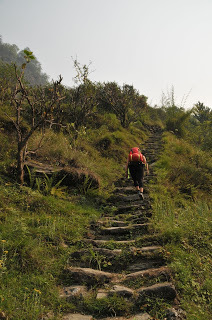 Climbing up after Kimrong River crossing.
Climbing up after Kimrong River crossing.Many of the trekkers don’t even know about altitude sickness and the problem it creates in the Himalayas. Himalayas are a completely different mountains with a distinctive climate and weather pattern of their own and unlike the Alps, they demand respect: you either bow to them or suffer the consequences. Owing to their geographic location, their vicinity to the equator, the speed at which the location moves around as the earth rotates, all of this create unique weather patterns and micro-climates that will test the limits of your stamina and physical fitness together with your body’s mechanisms of adjustment and adaptation. Here is the point: 3300m above sea level may never be the same for your body when you are in the Himalayas as you are in the Alps. So, be aware! But does your travel/trek company even talk to you about it? Does it tell you what you should do before you start? Is your guide sufficiently trained in first aid measures? A showy first aid box IS NOT the whole story when your porter/guide does not even know how to put a bandage, or CANNOT STOP YOU from taking alcoholic liquors when you are above 3000m! [You can take liquors, sure, but only when you know the limits of your body. If you are well acclimatized, you can drink, no problem.] It is YOUR money, sure, but damn you, if you do! I would rather prefer you vex your anger and retort rather than you get sick or throw up everything you have had swallowed!!
I have heard a local guide tell someone to call a helicopter but does he even know how much it costs? Or whether you are able to afford it or not?? And what about unreliable telephone coverage??? Would you wait and suffer worse, or would you rather follow the trail and make sure you feel better? [Ask any mountaineer, and he will tell you that the best you can do is “descend down, without any delay; and as fast as you can!” Or would you rather wait, for uncertainty???!!!!!] Why give wrong advice, I ask you?? The most sensible thing you can do is get down to a lower altitude, and if you can walk, where does a helicopter come in??? I do not know the answer other than the very simple reason that the agent can pocket a huge chunk of money you pay for the helicopter services. You can perfectly enjoy another trekking route, as beautiful as the first one, with that much money!!
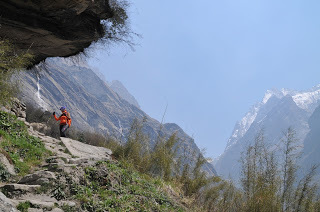 Hinku Cave, between Himalaya and MBC.
Hinku Cave, between Himalaya and MBC.Do you get enough photographic opportunities? Good opportunities?? Do you get told in advance about what you can do, and what you cannot?? What is permissible, and what not? What are the essentials you need to carry, and what can be useless or redundant?? Do you even know what is the best fresh healthy balanced food you can get along the trails????
Can you do that trek/trip in just 5 days?
If you have a right attitude, a right stamina, a fit physique, it is completely possible. I do not know about others, but with me it is possible; I make sure that it is. And I am not your average travel guide.I am different.
I am NOT associated with any agency, and hence you can save money on commissions! I am also MORE than your porter/guide in MANY WAYS. No documents will prove it; there are people who can testify. But I can provide you with a knife to sleep with and feel secure, or feel free to use it if not. That’s what I can guarantee!
I do not boast of anything like your trek/travel agent but I do not also come low quality. I bring much more with me: I come as a guide, as your first aid and safety advisor, as your paramedic, as your social/cultural advisor, as your photographer/photographic advisor, and as your friend.
"Mountains are not stadiums where I satisfy my ambition to achieve, they are the cathedrals where I practice my religion," reads Anatoli Boukreev's quote from his memorial chorten at Annapurna Base Camp. [Boukreev breathed his last on 25 December 1997 while attempting to climb Annapurna I. He was caught in an avalanche at around noon that day!]
So, is it possible? Five days??
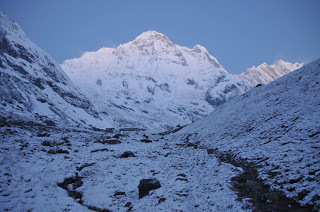 Annapurna Base Camp, just before sunrise.
Annapurna Base Camp, just before sunrise. I have been there. I have taken a “friend” [I do not use the word "client/s"] there and we have been back: a total of 5 days. No health problems, no safety issues, no trust issues, no hard feelings, no negativities. And we did not miss anything: many others we met on our way missed a lot (Some suffered from altitude sickness; others missed photographic opportunities).
It was possible for us. [And we had already done Kathmandu -- Gosain Kunda trek in Langtang National Park, and Jomsom -- Muktinath trek in lower Mustang, previously.]
YOU decide the rest.
[ Text and photographs by the author. All rights reserved. © 2016. For more photographs from the author, please contact the author, or visit his National Geographic page, at https://members.nationalgeographic.com/621978215984/ ]
Published on April 24, 2016 00:09
March 23, 2016
Pilgrimage along The Poisonous Trail
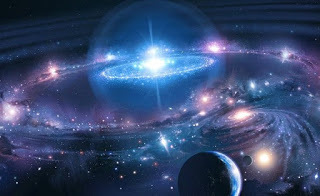 Relatives? Siblings?? Parents??? Family????
Relatives? Siblings?? Parents??? Family????After I got abandoned to my own fate, I became a wanderer: a wanderer of sorts; both within, and without.
Family gone, property gone. Job, income, money... I had almost nothing. A midlife crisis, one would say, but I am a believer in my own way. Then came a friend who wished to visit sacred and holy places where Shiva dwelt, one way or another. We had already done a major pilgrimage, in PashupatiNath, within the confines of the Valley called Kathmandu itself. Relatively nothing once you are in Kathmandu. The centuries old temple on the right bank of Bagmati River is a place of rituals for Kathmanduites like myself. Once I die, I would be burnt there: fire, ashes, smoke... I had already composed a poetic piece about my fate as that.
But for my friend it was not enough. NO, it would not be enough even for myself so easily. I agreed without a hesitation. It happened during a time when the celestial spheres had a different note, a different music to play.
Planetary Positions Uranus Opposition: midlife crisis. Sun in Pisces; Mercury in Pisces; Uranus in Pisces. Goodness, it’s about long-distance travels, voyages, journeys, pilgrimages…
Uranus Uranus rules surprise and all things unexpected. It also rules the future and new technology, including all that is newly invented and all that is un-imagined and yet to come.
Innovative, unpredictable, resourceful, imaginative, idiosyncratic and experimental, Uranus also rules creativity and scientific genius. Uranus' job is to break rules and demolish established patterns or structures, creating sudden, even radical, change. Uranus always works in sudden ways, and is called the Great Awakener.
Uranus gives a strong impulse for rebellion, independence, and even shock. Exciting and liberating, Uranus will overturn anything traditional, conventional or orthodox that it deems has outlived its usefulness.
This planet produces quick, liberating results, blending fact with intuition in its quest to discover universal truths. Uranus is considered the higher octave of intellectual Mercury, and is strongly objective and brainy, with no emotional side. Those people with strong Uranian influences in their charts are trailblazers and forerunners in their communities.
Since Uranus also holds sway over social change, it also regulates the global brotherhood of man and all humanitarian concerns, including environmental issues. Uranus rules the Aquarius. Finally, Uranus rules astrology.
This planet stays in a sign for seven years and therefore takes 84 years to circle the zodiac.
Mercury This little guy is the mythological messenger, communicating information to one and all. Mercury represents non-emotional, highly rational, objective thought. Its placement in a sign determines that sign’s intellectual style. As a quickly moving planet, Mercury is flexible, responsive and adaptable. A big part of Mercury’s job is to disburse information; as such it rules perception, language, writing, editing, research, speaking, all kinds of learning experiences and learning styles and the assessment of data. It rules telecommunications, computing, software, electronic gadgets, the postal service, shipping, couriers, and all forms of transportation. This planet has a LOT of responsibility.
When Mercury is retrograde, it scrambles information, causes static and confusion. Its effects are felt universally. Mercury retrograde episodes are highly unreliable to sign contracts, complete important transactions, access accurate information or make big decisions.
The sign and house in which Mercury resides in one’s chart reveals a great deal about that person’s natural style of gathering and giving out information. Mercury also rules sibling relationships, maps, letters, travel plans, appointments, roadways, vehicles, advertising, publishing, sales, and public relations.
Mercury rules both Gemini and Virgo. Mercury spends about two-three weeks in each sign, but when it retrogrades, which it does three to four times a year, it can stay in one sign as long as ten weeks. Never far from the Sun, it takes about one year to circle the zodiac.
The Sun As seen from Earth, the Sun is the brightest star in the universe. It is the center of our solar system, and the vital heart in any horoscope. Without the Sun, there would be no life. The Sun rules your will, your pride, your determination, your heart, health and vitality, the recognition you receive for work well done, your sense of purpose, and motivation for future goals. It is you, the individual. The Sun is your ego, governing how you see yourself, your self-esteem. It represents you, the individual. This planet also determines how others view you. An essentially masculine force, the Sun also wields influence over the significant men in your life, especially those in positions of authority. This may be your father, your current boyfriend or your husband, a guy-friend, or a male boss or client.
The Sun rules all daylight. In the same way it rules public recognition and self-image by illuminating who we are, the Sun also clarifies the characteristics any planet it touches and reveals truths about that planet. For example, if the Sun and Jupiter communicate in a special configuration, Jupiter’s goodness would be illuminated and made even more brilliant by the Sun. Under the nurturing light of the Sun, Jupiter’s strengths intensify, as do the benefits it bestows upon us.
The Sun takes one year to move through all twelve constellations (signs) of the zodiac. The Sun guards the heart. It is the ruler of the sign of Leo.
Pisces Pisces have an intuitive and psychic ability more then any other zodiac signs. Pisces is the sign of mysticism, mystery and the spiritual unknown. Pisces have formidable intuitive ability. Most Pisces are somehow involved with occult or spiritualism. Pisces are very good at understanding people for they have the ability to delve into the psyche and see behind a person's motivations. Pisces are not the pushovers that they may seem, in fact they have strength of character and will stand up for what they believe in and they can do hard work for something they believe in. They can be very lazy but only in matters that they do not care about. Pisces is the most sensitive of all zodiac signs.
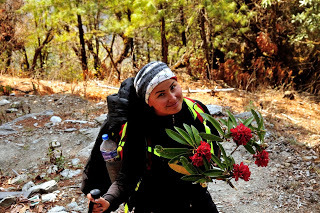 Having said all that about the planets, their transits and all the significance it all merits, a spiritually inclined friend had a knack of an idea to visit some divine holy place, where Shiva could be found, in some sort of a pilgrimage, and I had to comply. I am an eager traveller myself, as opportunity permits, and this was one not to be missed. It is not that I do not like to travel, I very much love to, beyond measure, but the pilgrimage chosen was a difficult one, and was fraught with many dangers. It is not that I am incapable of protecting my friends in times of need, but at some point one has to realize one’s limits and needs to plan and act accordingly. My friend chose to go to Gosain-Kunda, a high-Himalayan lake of many legends.
Having said all that about the planets, their transits and all the significance it all merits, a spiritually inclined friend had a knack of an idea to visit some divine holy place, where Shiva could be found, in some sort of a pilgrimage, and I had to comply. I am an eager traveller myself, as opportunity permits, and this was one not to be missed. It is not that I do not like to travel, I very much love to, beyond measure, but the pilgrimage chosen was a difficult one, and was fraught with many dangers. It is not that I am incapable of protecting my friends in times of need, but at some point one has to realize one’s limits and needs to plan and act accordingly. My friend chose to go to Gosain-Kunda, a high-Himalayan lake of many legends.It was early spring. Lower down the valley, the days have already begun to grow uncomfortably hot. But as we climbed up, there were still no signs of new buds except some rhododendron flowers reddening the forest greens. The afternoon air was still chilly and the morning, cold. Trails were still covered in snow after we crossed the 3300m mark. During the day, the snow melted, and the trails became wet and soft; in the afternoon as the sun grew to the west and its energy subsided, cold winds blew and the path froze again. Icy winds lapped the mountainsides with much ferocity. This trail is not for the faint-hearted or for the careless. Here, you need to respect the mountains, if you fail you simply become forgotten!
What then? You might ask. It’s just a lake, no?
NO, NOT AT ALL. It’s not just a lake as that, it is Shiva’s Lake, at an altitude of 4380m, and one has to climb up to 4400m just to have a glimpse of it. Imagine, an altitude where experienced mountaineers need about 7 days for acclimatization before actually being there!
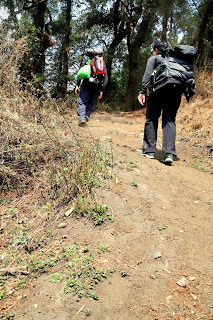 This is a story of legends, of old times, of some distant past. The gods and demons both agreed they needed to churn the Sea to produce some elixirs, just as they use the butter churn to produce butter. They used Mount Sumeru as the churn while Shesh Naga, the serpent god, agreed to be used as the rope. They wound the rope around the mountain and tugged from opposite sides; the sea thundered in turbulence, the universe shook with the sheer force. After ages had passed, two entities with two different qualities surfaced: one was the Immortalizing Elixir, “amrita”, while the other was the Universe-destroying Dark Poison called “Kalakut Veesh”.
This is a story of legends, of old times, of some distant past. The gods and demons both agreed they needed to churn the Sea to produce some elixirs, just as they use the butter churn to produce butter. They used Mount Sumeru as the churn while Shesh Naga, the serpent god, agreed to be used as the rope. They wound the rope around the mountain and tugged from opposite sides; the sea thundered in turbulence, the universe shook with the sheer force. After ages had passed, two entities with two different qualities surfaced: one was the Immortalizing Elixir, “amrita”, while the other was the Universe-destroying Dark Poison called “Kalakut Veesh”. The vessels were brought, the elixir was safely kept in one. They could not contain the poison as it would destroy the surrounding even with its mere vapour. What would happen to the universe if it got spilled???
Quickly realizing that there was no safe place to contain the poison, Lord Shiva hastily gulped it. Damn!!! The poison could not go down to the stomach as it would kill Shiva, and the Universe Herself, so it chose to stay where it was: declining to go down the throat, the Poison chose to get stuck inside Shiva’s throat… And Shiva, with the Hell-burning Pain in his throat, became helpless in alleviating the suffering it caused. He ran…!
Ordinary solution would not help in any way, no! He needed something cold enough to put the fire in his throat down. He climbed the Himalayas in faltering steps, oftentimes coughing along the way. Tiny cough droplets laden with traces of the poison soon spread out along the trail. Higher and higher He went, and when he could go no further because of the pain, he struck the ground with his trident the force of which made a huge bowl. Icy waters soon filled the “bowl of the mountain” and Shiva then reclined beneath the surface, merely to put the “fire of the poison” down.
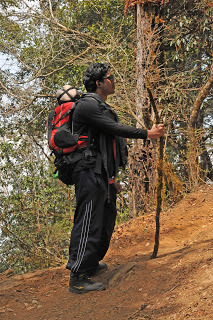 Many pilgrims suffer from altitude sickness along the trail while climbing up and need to be evacuated every year during the monsoon season when the major pilgrimage falls, for mysterious reasons. And where there are no vehicles, it is a risky venture fraught with dangers when the only thing that can carry you down to a safer altitude is another human being. The legend says it happens because of the poisons spread there due to Shiva’s coughing. Others assign it to the wild red, white and blue flowers and their particular repugnant scent.
Many pilgrims suffer from altitude sickness along the trail while climbing up and need to be evacuated every year during the monsoon season when the major pilgrimage falls, for mysterious reasons. And where there are no vehicles, it is a risky venture fraught with dangers when the only thing that can carry you down to a safer altitude is another human being. The legend says it happens because of the poisons spread there due to Shiva’s coughing. Others assign it to the wild red, white and blue flowers and their particular repugnant scent.Pilgrims, who manage to make it up to the lake and take a cleansing bath in its icy waters claim they can see Shiva’s reclining image beneath the surface.We kept wondering, how the majority of pilgrims would do it when there was rain and the slopes became as slippery as Hell: one missed foot and you could go beyond the cliff, even eagles would find it difficult to find your bones later!!!
Ours was a more or less philosophical pilgrimage combined, personally, with a visual one. My friend had an i-phone, I love my D-SLR. Another friend was only thinking about a downhill on his mountain bike. Anyway, we did it and found the journey to be awe-inspiring. It made me more humble in many ways, and taught me my limits as a human being.
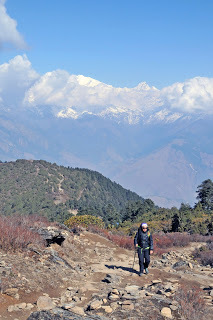 While climbing up beyond 3600m, I could feel my fingers and toes slowly go numb with a tingling sensation and so did my face. I knew I could take time at a lower altitude to acclimatize and do it safely but time was in short supply. So, I rather chose to do it fast: climb fast, and descend fast. I did exactly that and found my friends still climbing up when I was climbing down to the safer altitude after paying homage to the Old Man under the surface of a frigid lake. I had given them a spare torchlight and I waited below, straining my eyes every now and then. I was planning to organizing a rescue party if they were not to show there by the evening. And I heaved a sigh of relief when they showed up late, but just before night fell. I was happy to see everyone safe and sound although one of my friends coughed dangerously. I was alarmed but it was now safer, far far safer than above 4000m.
While climbing up beyond 3600m, I could feel my fingers and toes slowly go numb with a tingling sensation and so did my face. I knew I could take time at a lower altitude to acclimatize and do it safely but time was in short supply. So, I rather chose to do it fast: climb fast, and descend fast. I did exactly that and found my friends still climbing up when I was climbing down to the safer altitude after paying homage to the Old Man under the surface of a frigid lake. I had given them a spare torchlight and I waited below, straining my eyes every now and then. I was planning to organizing a rescue party if they were not to show there by the evening. And I heaved a sigh of relief when they showed up late, but just before night fell. I was happy to see everyone safe and sound although one of my friends coughed dangerously. I was alarmed but it was now safer, far far safer than above 4000m.My friend, despite suffering from lung and respiratory problems (it was already there before the long strenuous accent, and we thought it was just a cold) is safely back in Kathmandu where advanced medical help is available for her treatment and recovery.
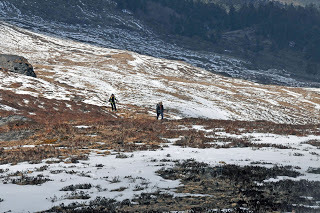 I still cannot fully comprehend how I did it. That, indeed, was a pilgrimage along the trail of poisons.
I still cannot fully comprehend how I did it. That, indeed, was a pilgrimage along the trail of poisons.[Text by the author, with help from Lara Burmistrova. All photographs by the author. Images related to planets and/or their related positions belong to their respective owners. Sourced on-line and used for educational purposes only.]
Published on March 23, 2016 07:26
October 5, 2015
Bell Jar, Sylvia Plath and I
 The Bell Jar, Sylvia Plath, and I
The Bell Jar, Sylvia Plath, and I“Suicide does not kill people, depression does.”
The world appears free. People move with their daily chores. Someone is laughing in a street corner, someone else is chatting with a girl nearby. A couple is seated at the table, enjoying drinks, and talking about something; the girl laughs, and by the look of it one can imagine he just said something funny to her. Some people just whiz by on their bicycles, chatting. And a couple passes, hand in hand, talking to each other in low voices that is just not audible.
The lawn changes, transformed by the blades of grass that shine with the sun and swing with the wind. The leaves of the trees change colour as the seasons pass by. People change the expression written on their faces with the emotions that beat within their hearts. There is love, there is hatred, there is understanding and there is ego; there is hope and there is care, there is also dream and there is frustration. There is bitterness but there is also the satisfaction of victory. But, but…
Bitterness is not a medicine, loneliness is not a cure of internal suffering. A good company is neither replaceable nor can be found with searching: it needs to happen. The hands of time and the rhythm of the ticking must match in harmony for the correct alignment to take place. And when that does not happen one loses the right path, one loses hope, one loses the purpose of life.
I am caged within the confines of space-time, and my wanting or not wanting, wishing or not wishing, trying and struggling produce no meaningful meaning. Emptiness remains emptiness, bitterness remains bitterness, and loneliness behaves adamant.
But what appears on the surface and what feels within are two completely different things. The inside and the outside seem to merge together as if in a continuum whereas the invisible wall that separates the two is always present there, as an invisible barrier for the continuum to continue both within and without. And that is the bell jar.
And while Sylvia Plath confessed that she attempted suicide more than once, more than even two or three or four or five times, I have tasted that desperation only twice. And if I choose to pick up a third time, it will be over, I know for sure.
It is just an easy comparison: a fly trapped inside an inverted glass perhaps might feel the same way as a human trapped within the confines of circumstances beyond recognition, beyond comprehension, and beyond the power of one’s influence. Despite the unending struggles one has made, and one is still making, many things remain that simply do not change: some wounds never heal, some broken pieces can never be glued back together. And while Plath imagined her life confined within the transparent walls of a bell jar, I find mine as fluid and dynamic as the fish in fast running water. She could not escape out into freedom, I am finding it impossible to swim against the currents of bitterness. That is perhaps humanity in-between us that makes us the same: similar experiences shared across the stretch of space and time within the influence of similar circumstances. And just like a caged bird, I want to be free just as Sylvia Plath wanted to be, just as water always wants to be… and then escape. It does not matter where, but what counts is if…
[The image of the first edition of "The Bell Jar" by Sylvia Plath has been taken from wikipedia, is fair use under United States copyright laws... https://en.wikipedia.org/wiki/The_Bell_Jar and the direct link is https://en.wikipedia.org/wiki/File:Belljarfirstedition.jpg .]
Published on October 05, 2015 10:12
June 9, 2014
Faces of Emotions
Faces
 Emotions are fluid: they melt, they flow, they solidify, they harden... It all reflects upon the conditions we find ourselves in, the experiences we gather as life progresses. Sometimes we cry, sometimes we get angry, sometimes, we feel pain, bitterness, angst... and sometimes we really feel over the moon. Sometimes we show it, sometimes we don't. Some of our faces reflect the emotions swelling inside us, some of us don't, and yet it is universal: suffering is what makes our emotions flow. We do not intend to, consciously, but subconsciously we let it go, we let it express on the outside.
Emotions are fluid: they melt, they flow, they solidify, they harden... It all reflects upon the conditions we find ourselves in, the experiences we gather as life progresses. Sometimes we cry, sometimes we get angry, sometimes, we feel pain, bitterness, angst... and sometimes we really feel over the moon. Sometimes we show it, sometimes we don't. Some of our faces reflect the emotions swelling inside us, some of us don't, and yet it is universal: suffering is what makes our emotions flow. We do not intend to, consciously, but subconsciously we let it go, we let it express on the outside.
We let it flow, we let it drop, we let it freeze, we let it pour, we let it drip, one by one, we let it swell, splash, crack... against the inevitable in a fit of bitterness, we let it melt again, and again...
We yearn for something, we hope, we dream, we plan and yet we live our lives without choices: life is the strange bird which flies with the wind. It knows how to beat its wings but it cannot go against the flow. No way! It cannot be dictated, directed, channelized, controlled: it just happens. The flow then, in a sense, dictates how its wings beat. If there were such a market where emotions could be sold and bought, if it was really possible for such a market to exist, what emotions would you have? What would you choose? What would you go for?? Which one would you want to feel???How much would you pay? How much would you give, how would you bargain, on the Emotic Street of life???
............................. *** ............................
P { margin-bottom: 0.08in; direction: ltr; widows: 2; orphans: 2; }P.western { font-size: 12pt; }P.cjk { font-size: 12pt; }P.ctl { font-size: 12pt; } FACES (7 September 2004)
In the market placewhere everything is soldbeyond all bargainare faces on display –rich face and poor face,glad face or sad one,dark or light, young or oldstare wide and plain.State your choiceand take your way.Which one would you buy?
Beyond the crowdof ignorant menaway from the sceneare faces on display –hard face and soft face,loathsome or lovely,artless or guilty, humble or proudinquire again and again.as you chooseso you pay.Which one would you buy?
In that canvas of lifewhere appearance deceivesand sympathies varybehind the black curtainare faces on display –dead face and live face,sweet face or bitter one,welcome or hostile, pleasant or angry;Which one would you love?Which one would you see?
Here in this market
come and buy me, me, me! they say.
Hopeful or forlorn, beautiful or ugly,familiar or foreignfaces to play –false one or true face wait upon, wait againfor another bargain;take your pick and carry away.Which one would you buy?
.......................... *** ...............................
(This composition first appeared in the anthology Dandelion in 2006. The one appearing above has been slightly edited and altered for the purpose of clarity. Copyright reserved with the author.
The image used in this post is a photo montage created by the author using some of the author's google plus followers. The final image has been flipped and inverted. The author thanks and apologizes at the same time for including some and not including others in the montage due to space constraints. No harm intended in any manner, whatsoever.)
 Emotions are fluid: they melt, they flow, they solidify, they harden... It all reflects upon the conditions we find ourselves in, the experiences we gather as life progresses. Sometimes we cry, sometimes we get angry, sometimes, we feel pain, bitterness, angst... and sometimes we really feel over the moon. Sometimes we show it, sometimes we don't. Some of our faces reflect the emotions swelling inside us, some of us don't, and yet it is universal: suffering is what makes our emotions flow. We do not intend to, consciously, but subconsciously we let it go, we let it express on the outside.
Emotions are fluid: they melt, they flow, they solidify, they harden... It all reflects upon the conditions we find ourselves in, the experiences we gather as life progresses. Sometimes we cry, sometimes we get angry, sometimes, we feel pain, bitterness, angst... and sometimes we really feel over the moon. Sometimes we show it, sometimes we don't. Some of our faces reflect the emotions swelling inside us, some of us don't, and yet it is universal: suffering is what makes our emotions flow. We do not intend to, consciously, but subconsciously we let it go, we let it express on the outside.We let it flow, we let it drop, we let it freeze, we let it pour, we let it drip, one by one, we let it swell, splash, crack... against the inevitable in a fit of bitterness, we let it melt again, and again...
We yearn for something, we hope, we dream, we plan and yet we live our lives without choices: life is the strange bird which flies with the wind. It knows how to beat its wings but it cannot go against the flow. No way! It cannot be dictated, directed, channelized, controlled: it just happens. The flow then, in a sense, dictates how its wings beat. If there were such a market where emotions could be sold and bought, if it was really possible for such a market to exist, what emotions would you have? What would you choose? What would you go for?? Which one would you want to feel???How much would you pay? How much would you give, how would you bargain, on the Emotic Street of life???
............................. *** ............................
P { margin-bottom: 0.08in; direction: ltr; widows: 2; orphans: 2; }P.western { font-size: 12pt; }P.cjk { font-size: 12pt; }P.ctl { font-size: 12pt; } FACES (7 September 2004)
In the market placewhere everything is soldbeyond all bargainare faces on display –rich face and poor face,glad face or sad one,dark or light, young or oldstare wide and plain.State your choiceand take your way.Which one would you buy?
Beyond the crowdof ignorant menaway from the sceneare faces on display –hard face and soft face,loathsome or lovely,artless or guilty, humble or proudinquire again and again.as you chooseso you pay.Which one would you buy?
In that canvas of lifewhere appearance deceivesand sympathies varybehind the black curtainare faces on display –dead face and live face,sweet face or bitter one,welcome or hostile, pleasant or angry;Which one would you love?Which one would you see?
Here in this market
come and buy me, me, me! they say.
Hopeful or forlorn, beautiful or ugly,familiar or foreignfaces to play –false one or true face wait upon, wait againfor another bargain;take your pick and carry away.Which one would you buy?
.......................... *** ...............................
(This composition first appeared in the anthology Dandelion in 2006. The one appearing above has been slightly edited and altered for the purpose of clarity. Copyright reserved with the author.
The image used in this post is a photo montage created by the author using some of the author's google plus followers. The final image has been flipped and inverted. The author thanks and apologizes at the same time for including some and not including others in the montage due to space constraints. No harm intended in any manner, whatsoever.)
Published on June 09, 2014 04:30
April 16, 2014
Healing The Heart
Healing The Heart

I am really tired: tired of the way life has to be dragged on. I sometimes wonder whether it was a really bad day, a really bad hour, a really bad time I was born to feel like this. Maybe the planets, the constellations were misaligned exactly at the hour I was born. I really wonder at the mysterious forces that have not worked for me, ever, the way that would have made me feel otherwise.
What would I do to change? Hhhmmmmm....!
I ponder upon various outlets from this impasse. I don't really like to live here: I would love to quit. Let all things be as they choose to be: I would really love to hit the road!!!
I calculate. How much would it take for me get a bicycle and travel inland? To places? To people? Never staying at one place, always on the move... To feel the pulse of life, to feel the beat, the rhythm, the music that I have lost far behind... If I were to die on the road, it would just be fine. I would have to anyway, somewhere. And if I lived, and if my mind were to change somehow, return back to where I sprouted out from?
Hhhmmmmm.....!! It wouldn't be simple, it wouldn't be easy. A year's journey would mean six months going one way and six months getting back, if I survived the ordeal, the quest of life, that is. And I calculate, that one year's journey would, could, cost anywhere between 10 thousand to 12 thousand... The visa fees, the return expenses, the roadblocks, the detours... the breakdowns and the unexpected... A lot of discouragements along. Yet I aim for the lower figure, of course, and still...
Are there no encouragements?
Of course there are, sure. But it depends on humanity.
It is quite strange to know there are hundreds of different people but only two types of humanity. Those who have cannot offer much and those who don't are simply unable to. It is poverty deep inside the soul, not a physical one, that determines who is who. Yes, I need to go searching in the most unlikely of places to find a good one that really matters. Here is an analogy: if I go into a bank I cannot find any money, for that I need to go to the street. I need to go to the poorest hut to find the richest of people that really matter. And that is what I intend to do. But...
But... That still would be an unimaginable sum of money; an awful lot... in US dollars.
Haven't counted even a quarter of that sum in my life, carried far far less, ever, seen only a fraction.
How old am I? Well, I have pretty much passed the mid point of my life, I guess.
But the wound needs to be healed, the broken pieces need to be glued back together... The tears need to be stitched and sewn, fixed in some way. The heart has to be brought back to look like a heart, to feel like one.
Stupid fellow! It's the bike that needs to be bought first, and the gear...!!
Forget it. Not possible.What then?Why not share the pieces if I can't find the whole? Why not feel the heart of humanity if I can't feel my own?Why not be human? Why not beat the drum if I can't play the music?
As long as I can. As far as I can afford to. What I have, if I have. The basic is there: some rice, some lentils, a few spoonfuls of tea, about a cup of sugar, about the same amount of salt, pepper, turmeric, ginger, garlic... a bed, a room, a stove, about a quarter of a cylinder full of gas, a few pots and pans, some plates... a few books, even. The PET bottle that originally contained a familiar cold-drink is empty: sorry, no cooking oil. Most often, there is not enough water except for drinking and it isn't significant how often I take a bath: basically I can go days more, even a week or two, than usual. Does it matter if I smell a little? No...! We all do, and if I can find a spray or deodorant then it can do the trick and save the uneasy feeling. Somedays I go hungry. But if you can adjust, you can probably find almost anything...
Interested? Come then, and be a part of me, my life. Give some (don't be ashamed, it's a choice, not a compulsion), take some (feel free), we can get along, I suppose. We laugh if we can, if we can't we cry. As long as you are human, as long as I am human...
May be you know how to stitch broken pieces, how to glue them back together, how to sew... Probably I can fix my heart in your company, if you don't mind.
My couch is available on humanitarian grounds. What do you say?
(This photo, by George Hodan and sourced from publicdomainpictures, reflects the difficult-to-understand yet universal human symbolism signifying submission, help and forgiveness... No religious bias intended except that of humanity. http://www.publicdomainpictures.net/v... )

I am really tired: tired of the way life has to be dragged on. I sometimes wonder whether it was a really bad day, a really bad hour, a really bad time I was born to feel like this. Maybe the planets, the constellations were misaligned exactly at the hour I was born. I really wonder at the mysterious forces that have not worked for me, ever, the way that would have made me feel otherwise.
What would I do to change? Hhhmmmmm....!
I ponder upon various outlets from this impasse. I don't really like to live here: I would love to quit. Let all things be as they choose to be: I would really love to hit the road!!!
I calculate. How much would it take for me get a bicycle and travel inland? To places? To people? Never staying at one place, always on the move... To feel the pulse of life, to feel the beat, the rhythm, the music that I have lost far behind... If I were to die on the road, it would just be fine. I would have to anyway, somewhere. And if I lived, and if my mind were to change somehow, return back to where I sprouted out from?
Hhhmmmmm.....!! It wouldn't be simple, it wouldn't be easy. A year's journey would mean six months going one way and six months getting back, if I survived the ordeal, the quest of life, that is. And I calculate, that one year's journey would, could, cost anywhere between 10 thousand to 12 thousand... The visa fees, the return expenses, the roadblocks, the detours... the breakdowns and the unexpected... A lot of discouragements along. Yet I aim for the lower figure, of course, and still...
Are there no encouragements?
Of course there are, sure. But it depends on humanity.
It is quite strange to know there are hundreds of different people but only two types of humanity. Those who have cannot offer much and those who don't are simply unable to. It is poverty deep inside the soul, not a physical one, that determines who is who. Yes, I need to go searching in the most unlikely of places to find a good one that really matters. Here is an analogy: if I go into a bank I cannot find any money, for that I need to go to the street. I need to go to the poorest hut to find the richest of people that really matter. And that is what I intend to do. But...
But... That still would be an unimaginable sum of money; an awful lot... in US dollars.
Haven't counted even a quarter of that sum in my life, carried far far less, ever, seen only a fraction.
How old am I? Well, I have pretty much passed the mid point of my life, I guess.
But the wound needs to be healed, the broken pieces need to be glued back together... The tears need to be stitched and sewn, fixed in some way. The heart has to be brought back to look like a heart, to feel like one.
Stupid fellow! It's the bike that needs to be bought first, and the gear...!!
Forget it. Not possible.What then?Why not share the pieces if I can't find the whole? Why not feel the heart of humanity if I can't feel my own?Why not be human? Why not beat the drum if I can't play the music?
As long as I can. As far as I can afford to. What I have, if I have. The basic is there: some rice, some lentils, a few spoonfuls of tea, about a cup of sugar, about the same amount of salt, pepper, turmeric, ginger, garlic... a bed, a room, a stove, about a quarter of a cylinder full of gas, a few pots and pans, some plates... a few books, even. The PET bottle that originally contained a familiar cold-drink is empty: sorry, no cooking oil. Most often, there is not enough water except for drinking and it isn't significant how often I take a bath: basically I can go days more, even a week or two, than usual. Does it matter if I smell a little? No...! We all do, and if I can find a spray or deodorant then it can do the trick and save the uneasy feeling. Somedays I go hungry. But if you can adjust, you can probably find almost anything...
Interested? Come then, and be a part of me, my life. Give some (don't be ashamed, it's a choice, not a compulsion), take some (feel free), we can get along, I suppose. We laugh if we can, if we can't we cry. As long as you are human, as long as I am human...
May be you know how to stitch broken pieces, how to glue them back together, how to sew... Probably I can fix my heart in your company, if you don't mind.
My couch is available on humanitarian grounds. What do you say?
(This photo, by George Hodan and sourced from publicdomainpictures, reflects the difficult-to-understand yet universal human symbolism signifying submission, help and forgiveness... No religious bias intended except that of humanity. http://www.publicdomainpictures.net/v... )
Published on April 16, 2014 12:43
March 22, 2014
The Mirage of Happiness
 The Mirage of Happiness
The Mirage of HappinessP { margin-bottom: 0.08in; direction: ltr; color: rgb(0, 0, 10); }P.western { font-family: "Times New Roman",serif; font-size: 12pt; }P.cjk { font-family: "WenQuanYi Zen Hei Sharp"; font-size: 12pt; }P.ctl { font-family: "Lohit Devanagari"; font-size: 12pt; }
[Preface It is indeed very difficult, almost impossible, to come back from the dead and it has taken a rather long time. Just a few days back someone had suggested, "You need to 'hook things out', you know... if you can't get it with straight fingers."
"Never learnt to bend (my) fingers like the politicians. Now at this stage in life when my hairs are greying over....," I told him. He giggled but then suddenly I brightened up. "You know sometimes I feel like I'm being lured to the end of the line. One day the Big Angler, instead of finding the bait gone, shall surely hook me up like a minnow or a carp. That'll be the only hooking up I'll experience now, I think," I added.
He burst out to his seams with laughter.
]
...Enchained, paralyzed, restricted, caged... I live at the end of a blind alley, if I live at all.
Do I cry over it? I do. What else is left there to do except lament over things and events that could have taken a far better turn and might have made heaven possible but instead chose not to.
Is there independence? No way! The Bird of Freedom is enchained.
Is there hope? A tiny flickering of light is still visible far, far away. That's all.
How do I live then? Moment to moment just as I die with every beat of my heart. I don't kill myself outright. I feel like I need to suffer what others can't.
Why? I don't know. I just feel it in my head, feel it deep inside.
How can I continue like this? There are dozens of ways I cannot continue along. What remains in the end is the only possibility, no? The wind can flatten me down to the ground, crush me. But it won't break the chain, carry me off. And so I remain... where I have been chained.
I oftentimes pull the hairs out of my head, bite hard and swallow harder. It's unfortunate that I haven't gone insane so far but that would have been better I suppose. And yet to preserve my sanity I keep thinking about the possibilities: what would I do if I had all the things that you have? All the opportunities, the doors as well as the windows?
And perhaps that makes me who I am.
Do I not worry? I certainly do. If humanity were not to worry about things that could go wrong, then progress would have been impossible and everything would have gone backwards in time. Neither mistakes could have been avoided, nor disasters averted.
There are regrets, sure. When limitations confine you, there are fewer options to pick up, possibilities get reduced. Oftentimes one just has to face it all and suffer hopelessly. But perhaps that is what it is that makes a man(kind). No ego, no pride... Just a humble being with profound realizations that there are many things that cannot ever be changed, many events that cannot ever be undone, changed or chosen.
And these are integral parts of life. And that is one good thing that has to be lived, dull or colourful. As it comes. The question is not what comes but how one faces it. Yes there are certainly ways to stand and face the tribulations like a man(kind).
So, even if it be just glasses of water, let's clink them and celebrate. At least for a moment, at least for the time being, and as long as we're together.
Cheers!
[The passage or passages presented above are taken from a book by the author. The emoticon has been taken from google search and I hold no copyrights to it: it belongs to the original creator and/or copyright holder who I do not know. It has been used here for purely literary/educational purposes. When claimed, credits shall be duly given/made to the rightful owner.]
Published on March 22, 2014 04:06
November 12, 2013
Rumi: The Eternal Wisdom
What do you think will happen?
and
Say, 'I am You'

The word, or the name Rumi in Arabic, literally translates into 'Roman' as Jalāl ad-Dīn Muḥammad Balkhī lived at his time in what used to be Anatolia, subject to and part of the great Byzantine Empire. The word Mevlâna often attached as part to his name means "having to do with the master". He was a poet, a philosopher, and a Sufi mystic.
There is no question of a doubt that Rumi belonged, and still belongs, to the whole of humanity, and not to any religion, faith or nationality, as he himself wrote. It is indeed the greatest of all feelings, a much elated and divine one, to take the privilege to announce in words that one does not belong to any known boundaries marked by humanity itself. It is also the very heightened knowledge of one's understanding, one that touches to the very core of humanity's existence, the very essence of one's being, as part of humanity itself, in the first place.
Here is an example, from the book Rumi, Fountain of Fire, by Nader Khalili.
Ghazal: 838 What Do You Think Will Happen?
If you can't go to sleep,my dear soul,for tonight,what do you think will happen?
If you pass your nightand merge it with dawnfor the sake of heart,what do you think will happen?
If the entire worldis covered with the blossomsyou have labored to plant,what do you think will happen?
If the elixir of lifethat has been hidden in the darkfills the deserts and towns,what do you think will happen?
If because of your generosity and lovea few humans find their lives,what do you think will happen?
If you pour an entire jarfilled with joyous wineon the heads of those already drunk,what do you think will happen?
Go my friendbestow your love even on your enemies...If you touch their heartswhat do you think will happen?
Obviously, there are two different levels from where the answers might come to these questions. On the lower level, if all of those things were to happen, nothing special or noteworthy will come out as a result. Nothing will happen. Time will move on; Life will continue. But on a higher level, everything will happen all at once; the transformations will be immense and extraordinary, beautiful and divine. I become humble, I flood my surroundings with all the love until I empty my heart, until I weep, both body and soul, until I melt, until I become the ocean... There will be both longing and belonging, both earthly and divine, both humane and godly... AND THERE WILL NOT ONLY BE ME WHO WILL MOULT AND CHANGE; SOMEONE ELSE OR MANY OTHERS WILL ALSO UNDERGO SIMILAR TRANSFORMATIONS.
[As an explanation, if i were to be sleepless for one night, then i might be playing ten thousand ideas inside my head; i might be writing a beautiful poem; a humane story; or sharing the night with someone under the stars... the possibilities are endless... And there is not only one question in this poem, there are many... of immense meaning and importance. There is an IMMENSITY in its implications.]
Truly, these questions are for the seeker at heart: the address made to the soul is a divine address made to the seeker, to the whole of humanity itself. These are the questions one must ask, to oneself, and then also be the wanderer in search of the answers, and find them.
[I want to know how God created this world. I am not interested in this or that phenomenon, in the spectrum of this or that element. I want to know His thoughts; the rest are details. -Albert Einstein]
To compose and to write what can be no other than the greatest of all truths, I believe one needs to have gone through an enormous metamorphosis in life itself; one that has foreseen the greatest of upheavals. One has to rise above reason, above belief, above logic, and cross all physical barriers to see and sense things that are eternal.
I love one of Rumi's poems beyond all others, not because I love poetry and compose one or two at times but because of the enormity of the truth it carries across humanity's ages. Perhaps it possesses the ability to touch my heart also because of its eternal wisdom, or because I have had some great upheavals in my own life, I do not know. Whatever the reason I find myself in this poem, I am perhaps attempting to be a fool by looking at it from a perspective I should not have ever dared to envision... It would be a folly to look at something eternal that way, but so be it with this Rumi's poem titled "Say, 'I am you'."
I am dust particles in sunlight,I am the round sun.
(What are each of us essentially? Chemicals, compounds, molecules, atoms, elements? Dust... just as the sun is made of... from the smallest, the particle of dust, to the largest, the star as the sun...)
To the bits of dust I say, 'Stay'.
To the sun, 'Keep moving'.
(I, even though dust in essence, wish to live longer, hence stay longer; wish to have more, wish to possess the best, the most... but what do I wish for the sun, the only source of energy to all life-forces on earth? To keep moving, to go away... Yet, what else can I do for it? It has to move on, it is treading along a cosmic path I can only wonder at...)
I am the morning mist,
and the breath of evening.
I am the wind at the top of a grove,
and the surf on the cliff.
(I am human imagination... I am the air laden with freedom... I love to wander... I love to explore, to play, to be aloft of things at times... but I am also life itself...)
Mast, rudder, helmsman, and keel,
I am also the coral reef they founder on. I am a tree with a trained parrot in its branches.
Silence, thought, and voice.
The musical air coming through a flute,
a spark of stone, a flickering in metal.
Both candle and the moths crazy around it.
Rose, and the nightingale lost in the fragrance.
I am all orders of being, the circling galaxy,
the evolutionary intelligence, the lift,
and the falling away.
What is, and what isn't...
..............
Rumi: Page on Wikipedia
Rumi's poems belong to humanity and are not copyright protected to a great extent except, perhaps, some translations.
One can find many books on Rumi at http://www.allbooksfind.net/book-shelf-r/rumi-books-free-download/
Books on Sufism and books by Rumi can be found here as well:
http://www.thesufi.com/sufi_ebooks/
Rumi's poems in translation can also be read here:
http://blissbat.net/rambles/rumi.html
My Favourite "Rumi" on YouTube1. Poem of the Atoms https://www.youtube.com/watch?v=GaNGDrKKasA
2. Say I am Youhttps://www.youtube.com/watch?v=QqVBGv2hpQ4
Do a "google" search on Rumi, for more.
(All text except the poem by the author; with partial opinions and analysis in brackets. 'What Do You Think Will Happen' translated from Persian by Nader Khalili. 'Say I Am You' translated--or rather, transliterated--by Coleman Barks. The end of the poem has been omitted here where Rumi asks the reader to tell him he is Rumi, or to see Rumi within himself while introducing [while giving an introduction]. Image copyright of their respective owners, if any. Videos of Rumi's poems on this blog are linked and are not mine.)
and
Say, 'I am You'

The word, or the name Rumi in Arabic, literally translates into 'Roman' as Jalāl ad-Dīn Muḥammad Balkhī lived at his time in what used to be Anatolia, subject to and part of the great Byzantine Empire. The word Mevlâna often attached as part to his name means "having to do with the master". He was a poet, a philosopher, and a Sufi mystic.
There is no question of a doubt that Rumi belonged, and still belongs, to the whole of humanity, and not to any religion, faith or nationality, as he himself wrote. It is indeed the greatest of all feelings, a much elated and divine one, to take the privilege to announce in words that one does not belong to any known boundaries marked by humanity itself. It is also the very heightened knowledge of one's understanding, one that touches to the very core of humanity's existence, the very essence of one's being, as part of humanity itself, in the first place.
Here is an example, from the book Rumi, Fountain of Fire, by Nader Khalili.
Ghazal: 838 What Do You Think Will Happen?
If you can't go to sleep,my dear soul,for tonight,what do you think will happen?
If you pass your nightand merge it with dawnfor the sake of heart,what do you think will happen?
If the entire worldis covered with the blossomsyou have labored to plant,what do you think will happen?
If the elixir of lifethat has been hidden in the darkfills the deserts and towns,what do you think will happen?
If because of your generosity and lovea few humans find their lives,what do you think will happen?
If you pour an entire jarfilled with joyous wineon the heads of those already drunk,what do you think will happen?
Go my friendbestow your love even on your enemies...If you touch their heartswhat do you think will happen?
Obviously, there are two different levels from where the answers might come to these questions. On the lower level, if all of those things were to happen, nothing special or noteworthy will come out as a result. Nothing will happen. Time will move on; Life will continue. But on a higher level, everything will happen all at once; the transformations will be immense and extraordinary, beautiful and divine. I become humble, I flood my surroundings with all the love until I empty my heart, until I weep, both body and soul, until I melt, until I become the ocean... There will be both longing and belonging, both earthly and divine, both humane and godly... AND THERE WILL NOT ONLY BE ME WHO WILL MOULT AND CHANGE; SOMEONE ELSE OR MANY OTHERS WILL ALSO UNDERGO SIMILAR TRANSFORMATIONS.
[As an explanation, if i were to be sleepless for one night, then i might be playing ten thousand ideas inside my head; i might be writing a beautiful poem; a humane story; or sharing the night with someone under the stars... the possibilities are endless... And there is not only one question in this poem, there are many... of immense meaning and importance. There is an IMMENSITY in its implications.]
Truly, these questions are for the seeker at heart: the address made to the soul is a divine address made to the seeker, to the whole of humanity itself. These are the questions one must ask, to oneself, and then also be the wanderer in search of the answers, and find them.
[I want to know how God created this world. I am not interested in this or that phenomenon, in the spectrum of this or that element. I want to know His thoughts; the rest are details. -Albert Einstein]
To compose and to write what can be no other than the greatest of all truths, I believe one needs to have gone through an enormous metamorphosis in life itself; one that has foreseen the greatest of upheavals. One has to rise above reason, above belief, above logic, and cross all physical barriers to see and sense things that are eternal.
I love one of Rumi's poems beyond all others, not because I love poetry and compose one or two at times but because of the enormity of the truth it carries across humanity's ages. Perhaps it possesses the ability to touch my heart also because of its eternal wisdom, or because I have had some great upheavals in my own life, I do not know. Whatever the reason I find myself in this poem, I am perhaps attempting to be a fool by looking at it from a perspective I should not have ever dared to envision... It would be a folly to look at something eternal that way, but so be it with this Rumi's poem titled "Say, 'I am you'."
I am dust particles in sunlight,I am the round sun.
(What are each of us essentially? Chemicals, compounds, molecules, atoms, elements? Dust... just as the sun is made of... from the smallest, the particle of dust, to the largest, the star as the sun...)
To the bits of dust I say, 'Stay'.
To the sun, 'Keep moving'.
(I, even though dust in essence, wish to live longer, hence stay longer; wish to have more, wish to possess the best, the most... but what do I wish for the sun, the only source of energy to all life-forces on earth? To keep moving, to go away... Yet, what else can I do for it? It has to move on, it is treading along a cosmic path I can only wonder at...)
I am the morning mist,
and the breath of evening.
I am the wind at the top of a grove,
and the surf on the cliff.
(I am human imagination... I am the air laden with freedom... I love to wander... I love to explore, to play, to be aloft of things at times... but I am also life itself...)
Mast, rudder, helmsman, and keel,
I am also the coral reef they founder on. I am a tree with a trained parrot in its branches.
Silence, thought, and voice.
The musical air coming through a flute,
a spark of stone, a flickering in metal.
Both candle and the moths crazy around it.
Rose, and the nightingale lost in the fragrance.
I am all orders of being, the circling galaxy,
the evolutionary intelligence, the lift,
and the falling away.
What is, and what isn't...
..............
Rumi: Page on Wikipedia
Rumi's poems belong to humanity and are not copyright protected to a great extent except, perhaps, some translations.
One can find many books on Rumi at http://www.allbooksfind.net/book-shelf-r/rumi-books-free-download/
Books on Sufism and books by Rumi can be found here as well:
http://www.thesufi.com/sufi_ebooks/
Rumi's poems in translation can also be read here:
http://blissbat.net/rambles/rumi.html
My Favourite "Rumi" on YouTube1. Poem of the Atoms https://www.youtube.com/watch?v=GaNGDrKKasA
2. Say I am Youhttps://www.youtube.com/watch?v=QqVBGv2hpQ4
Do a "google" search on Rumi, for more.
(All text except the poem by the author; with partial opinions and analysis in brackets. 'What Do You Think Will Happen' translated from Persian by Nader Khalili. 'Say I Am You' translated--or rather, transliterated--by Coleman Barks. The end of the poem has been omitted here where Rumi asks the reader to tell him he is Rumi, or to see Rumi within himself while introducing [while giving an introduction]. Image copyright of their respective owners, if any. Videos of Rumi's poems on this blog are linked and are not mine.)
Published on November 12, 2013 00:54



